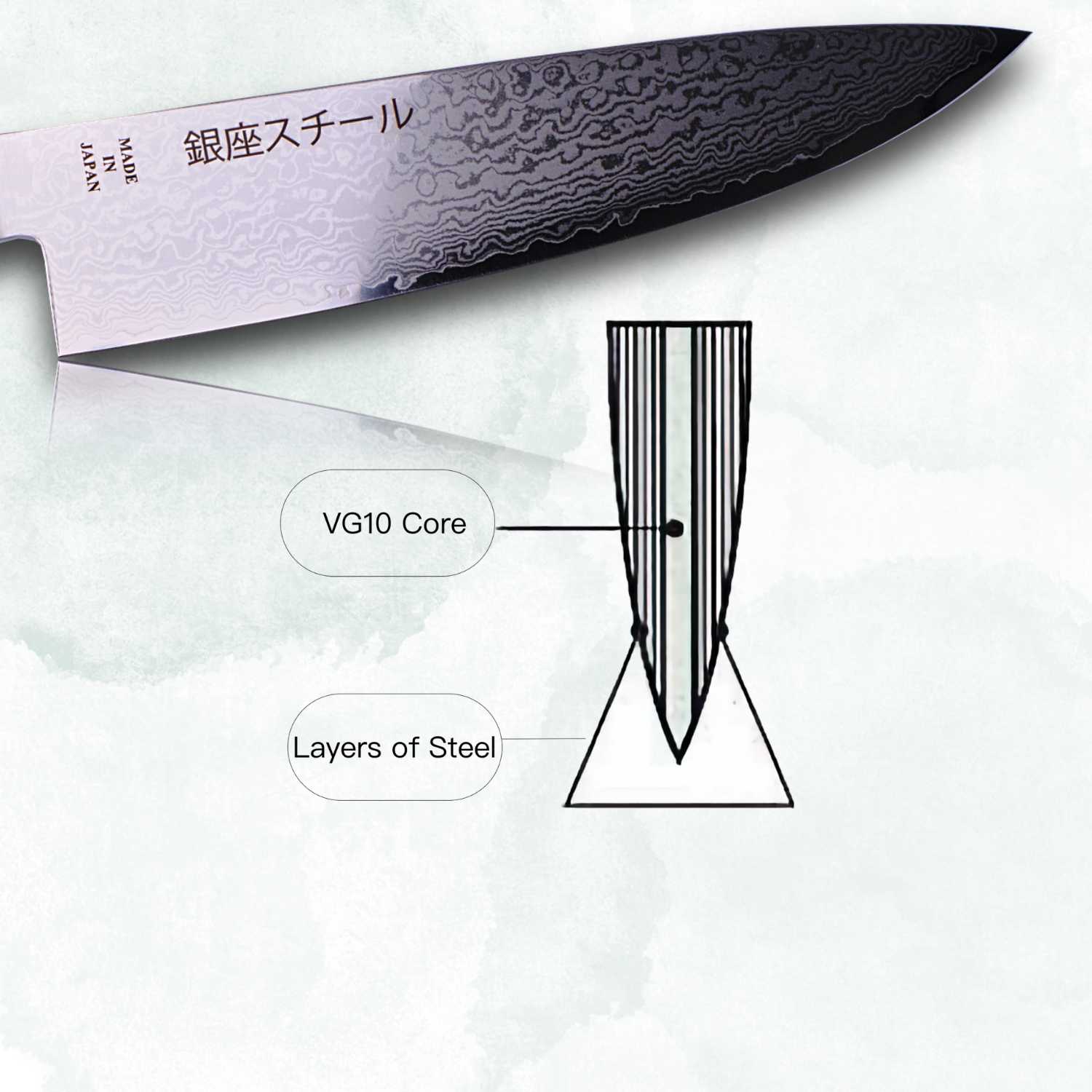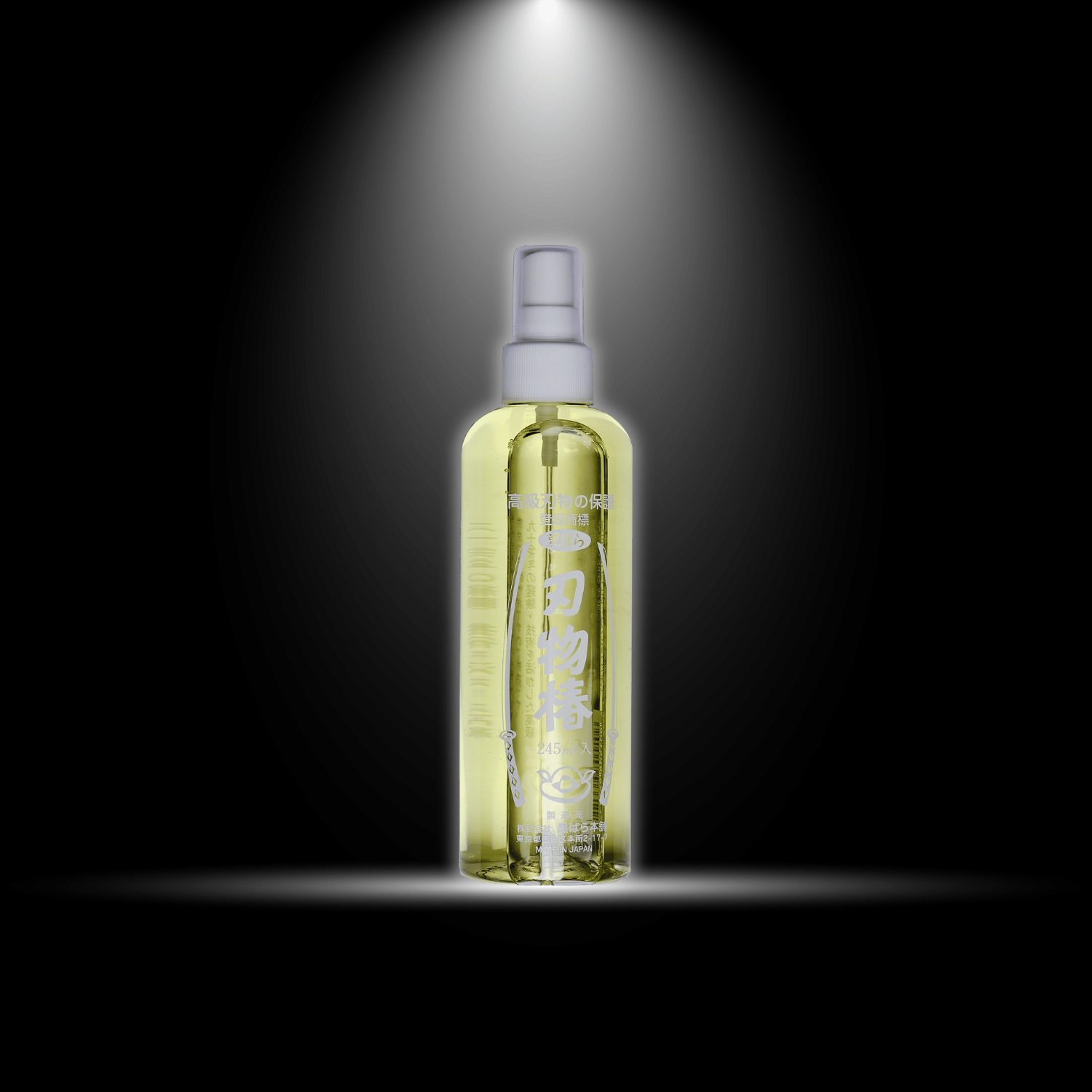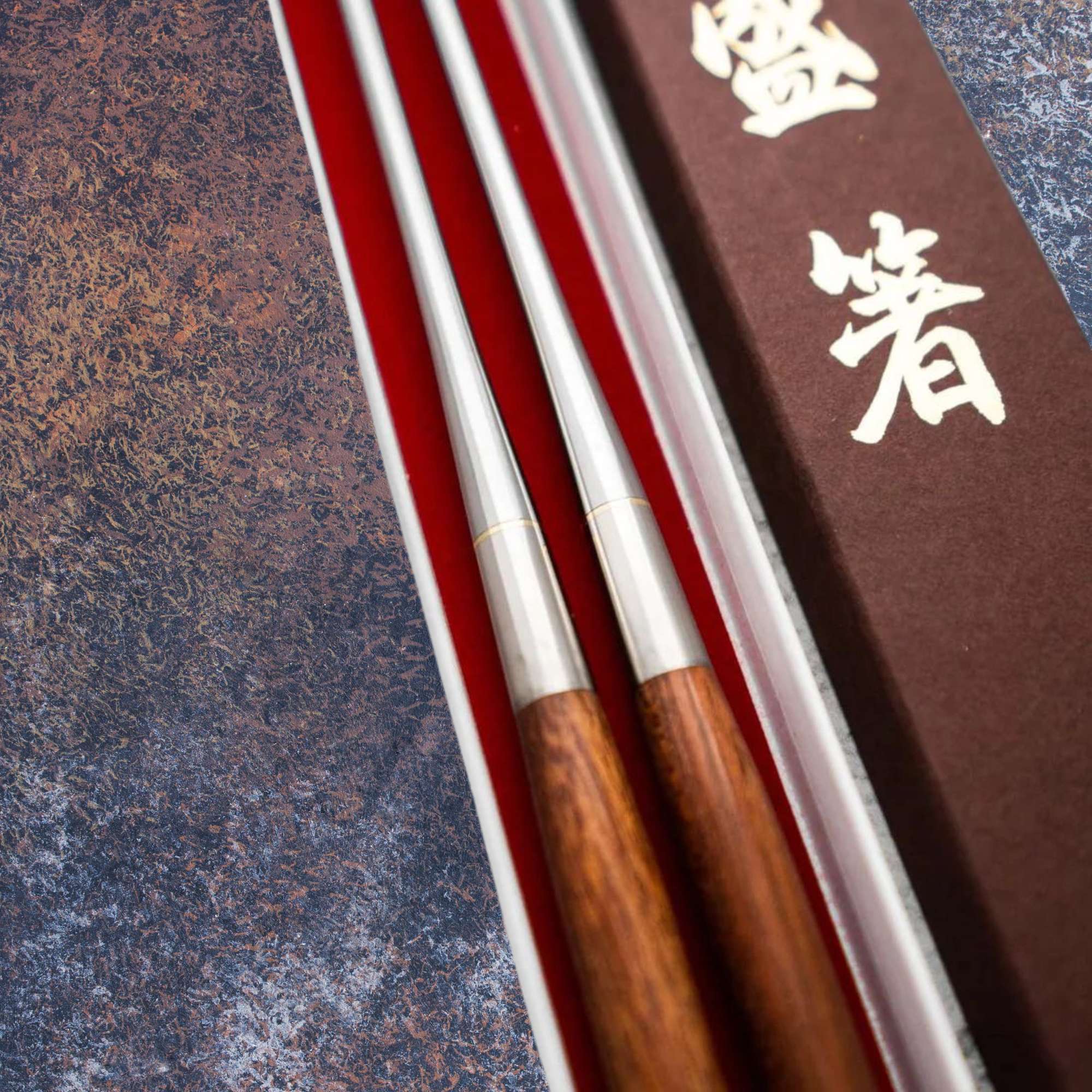
VG10 Damascus Steel: The Pride of Japanese Knives
Intro
From sushi chefs to culinary enthusiasts worldwide, the allure of VG10 Damascus Steel Japanese knives is undeniable. These knives are revered for their sharpness, durability, and aesthetics, making them an essential tool in any kitchen. This post delves into the fascinating world of VG10 Damascus Steel, exploring its origin, unique characteristics, and why it makes Japanese knives stand out.
Understanding the Significance of VG10 Steel

Diving into the depths of VG10 Steel, or V Gold 10 as it's also known, it's clear to see why it's considered the gold standard in the stainless steel world. With its roots firmly planted in Japanese soil, this steel's distinction lies in its unique composition. The label "VG10" isn't just a random assortment of characters. It carries significant meaning. The "VG" stands as a symbol of "Gold," an emblem of the highest standard. The "10" is a testament to its carbon content, which approximates 1%.
What does this high carbon percentage mean for the performance of a knife? It creates a delicate balance between hardness and malleability, making it a dream material for kitchen knives. The hardness assures exceptional edge retention, keeping the knife sharp for extended periods. On the flip side, the malleability helps the knife resist chipping, a common issue with overly hard materials.
Just think of VG10 steel as a gold medalist athlete, exhibiting a perfect balance of strength and flexibility to outperform competitors. It's this unique quality that makes VG10 steel a preferred choice for top-of-the-line kitchen knives.
Best material for kitchen knives. Cobalt is a d d e d to this material, so this blade have excellent sharpness and durability.
The Unparalleled Craftsmanship of Damascus Steel
When you hear the term Damascus steel, it evokes images of legendary blades of yesteryears, born from a meticulous art of craftsmanship. This type of steel, known for its distinctive, flowing water-like patterns, holds a rich history that dates back to ancient times. Its name derives from Damascus, the Syrian city where it was initially forged to create swords that were legendary for their unparalleled sharpness and durability.
Today, the technique to create original Damascus steel is considered a lost art. However, the term "Damascus" has been adopted to describe modern steel that is forged to mimic the historical metal's distinctive aesthetics and strength. The creation of this modern Damascus steel involves a painstaking process that can be likened to a labor of love.
Multiple layers of different types of steel are fused together. This fusion process isn't as simple as it sounds. It requires the careful heating, forging, folding, and hammering of the steel layers, resulting in the signature patterned design that Damascus steel is famous for. It's these patterns, akin to rippling water or intricate wood grains, that give each Damascus steel knife a unique identity.
The process doesn't just result in a stunning visual appeal; it also contributes to the steel's enhanced strength. The multiple layers make Damascus steel knives extremely resilient, adding to their overall performance and longevity. The skill and time invested in creating these knives underscore the unparalleled craftsmanship behind Damascus steel, keeping the legacy of the ancient art alive in contemporary culinary tools.
The Fusion of VG10 and Damascus Steel
When the remarkable characteristics of VG10 steel intertwine with the beauty and strength of Damascus steel, the outcome is nothing short of extraordinary: a VG10 Damascus Steel Knife. This fusion is not merely about melding two types of steel but about harmonizing superior functionality with captivating aesthetics. The heart of these knives lies in the VG10 steel core, a hero responsible for delivering prolonged sharpness that chefs covet.
However, the VG10 is not alone in its mission. Encasing this high-carbon core is the stunning cloak of Damascus steel. The rhythmic patterns of this steel bear a testament to its past, its journey through the forge. But it doesn't just please the eye. The layers of Damascus steel bestow the knife with augmented strength and durability, becoming a shield that defends the knife against time and wear.
In the world of culinary tools, VG10 Damascus Steel Knives are like well-composed symphonies, a blend of notes that result in a masterpiece. It is through this harmonious blend that these knives promise a superior cutting experience without compromising on the visual delight. Each slice and dice with these knives are not just about preparing ingredients but about cherishing a craft that combines the best of two worlds.
The Cutting Edge: Performance of VG10 Damascus Steel Knives
When it comes to the performance of VG10 Damascus Steel knives, the word 'extraordinary' barely covers it. These culinary marvels are a testament to the perfect marriage of function and form, which is evident in every slice, chop, or dice. Imagine having a blade that remains exceptionally sharp over time, owing to the high-carbon VG10 core. Its sharpness is not a fleeting attribute but one that stands the test of time, reducing the need for frequent honing or sharpening.
However, the sharpness is just one side of the story. The true beauty of VG10 Damascus Steel knives lies in the resilience they offer. The Damascus steel cladding plays a pivotal role here, wrapping the VG10 core in an embrace that is both protective and decorative. It enhances the knife's durability, allowing it to face the rigors of daily kitchen tasks with ease. Plus, its inherent resistance to corrosion means these knives maintain their visual appeal, no matter how many times they've been at your service.
This outstanding performance has won VG10 Damascus Steel knives a place in the kitchens of professional chefs and culinary enthusiasts worldwide. From slicing paper-thin sashimi to dicing crisp vegetables, these knives handle a variety of tasks with precision and ease. Their extraordinary performance is a testament to the power of Japanese craftsmanship, turning every meal preparation into an experience worth savoring.
How to Care for Your VG10 Damascus Steel Knife
Maintaining the pristine condition of your VG10 Damascus Steel knife extends beyond simply wielding it with skill. Adopting a few simple care practices can help preserve the knife's performance and appearance over time. For starters, the cleaning process should be gentle yet thorough. Opt for a hand wash using warm water with a dash of mild soap instead of a dishwashing cycle. Immediate drying after washing is key to avoid any unsightly rust spots on your precious blade.
Beyond keeping it clean, honing the edge with a honing rod on a regular basis can help maintain the knife’s razor-sharp edge. Remember, sharpness is a cornerstone of VG10 steel, and regular honing ensures that this attribute doesn't fade away. However, should the knife's sharpness wane despite your best efforts, professional sharpening can breathe new life into the blade, restoring it to its former glory.
As much as VG10 Damascus Steel knives love a good slicing or dicing challenge, they don’t take too well to hard surfaces. So steer clear of glass, granite, or similar hard materials when choosing a cutting board. Opt instead for a softer surface, such as wooden or plastic cutting boards, to prevent potential chipping of your knife.
By following these guidelines, you can ensure that your VG10 Damascus Steel knife remains your trusted culinary companion for years to come, always ready to lend a hand, or rather a blade, to your cooking adventures.
Why Choose a VG10 Damascus Steel Japanese Knife
Embarking on a culinary journey with a VG10 Damascus Steel Japanese knife is like being accompanied by a reliable friend who knows their craft. It's about embracing an amalgamation of strength and beauty, functionality, and artistry. These knives are more than just kitchen utensils; they are pieces of history, each showcasing a story of ancient techniques blended with modern science.
Their superior performance stems from the remarkable attributes of VG10 steel - its gold-standard hardness that promises long-lasting sharpness and a toughness that defends against chipping. Not to forget the added resilience offered by the multiple layers of Damascus steel, enhancing the knife's endurance to withstand the rigors of a bustling kitchen.
But it's not all work and no play with these knives. The fascinating patterns of Damascus steel make each piece a visual treat, adding a dash of elegance to your kitchen tools. It’s like having a work of art that not only pleases the eye but also effortlessly aids in your culinary exploits.
Whether you're a seasoned chef commanding a bustling restaurant or a passionate home cook exploring culinary delights, VG10 Damascus Steel Japanese knives are game-changers. They offer you a seamless blend of performance and aesthetics, making your cooking experience not just efficient, but thoroughly enjoyable. So, as you ponder your next kitchen investment, remember the magic of VG10 Damascus Steel Japanese knives – an investment that offers both reliable performance and undeniable charm.
TOP 5 VG10 Damascus Steel Knives
HAYAMI 200 VG10 69 Layered Damascus Steel Gyuto 200mm is a remarkable fusion of artistry and functionality. Handcrafted in Japan, this Gyuto knife showcases a stunning 69-layered Damascus steel blade, combining elegance and durability. The VG10 steel core ensures exceptional sharpness and edge retention, making it ideal for various cutting tasks. With its ergonomic handle and balanced design, this Gyuto knife offers precise control and effortless cutting, elevating your culinary experience to new heights
The HAYAMI 180 VG10 33 Layered Damascus Santoku Knife is a true masterpiece handmade in Japan. With its 180mm blade, this knife combines traditional craftsmanship with modern technology. The VG10 steel core and 33-layered Damascus pattern ensure exceptional sharpness, durability, and beauty. From precision slicing to delicate chopping, this Santoku knife is a versatile tool that embodies the essence of Japanese culinary excellence.

VG-10 is cobalt-added special high carbon stainless steel and high-ranked Japanese Stainless Steel for Sharpness edge retention and durability.
The Santoku knife is the most popular type of knife that has evolved with Japanese culture.
It is an all-purpose knife that can prepare pretty much any ingredient. Although its birthplace is Japan, its convenience has spread overseas, and in recent years many non-Japan-made Santoku Knives have been found.

The Ichizu Series Kiritsuke Gyuto Knife is a meticulously crafted culinary tool designed for precision and performance. With a blade length of 210mm, this knife is ideal for versatile cutting tasks in the kitchen. Originating from Japan, it showcases the artistry and expertise of Japanese craftsmanship. The Kiritsune Gyuto Knife is characterized by its sharp edge, balanced weight, and ergonomic design, making it a must-have for culinary enthusiasts and professional chefs alike. Elevate your culinary experience with this high-quality knife that seamlessly combines tradition and modern functionality.

Elevate your culinary skills with the KC Series KATANA 20 Chef Knife - an 8" masterpiece featuring Damascus VG10 Steel, 67-layer precision, and a comfortable G10 handle. Unleash Shun and Miyabi-inspired excellence in your kitchen with a stunning Damascus patterned blade. Discover the perfect blend of craftsmanship and performance for a chef's essential.




















Leave a comment
This site is protected by hCaptcha and the hCaptcha Privacy Policy and Terms of Service apply.